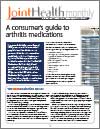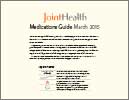In this issue
- A consumer’s guide to arthritis medications
- Two new medication classes
- The "therapy conversation"—It's personal
- Methotrexate...the old...made new
- Personalizing medicine

 In a recent Arthritis Consumer Experts’ (ACE) program satisfaction survey of people living with arthritis, seventy percent said that knowing as much as possible about their medications was a priority. Healthcare providers also weighed in, saying that the JointHealth™ Medications Guide is a helpful and trusted tool for their patients. In this special issue of JointHealth™ monthly, ACE presents the 2015 edition of our Medication Guide, providing consumers the latest information about medications and the future of arthritis treatment. For more than a decade, the JointHealth™ Medications Guide has been a reliable source of essential information about the medications most commonly prescribed by arthritis specialists to treat:
In a recent Arthritis Consumer Experts’ (ACE) program satisfaction survey of people living with arthritis, seventy percent said that knowing as much as possible about their medications was a priority. Healthcare providers also weighed in, saying that the JointHealth™ Medications Guide is a helpful and trusted tool for their patients. In this special issue of JointHealth™ monthly, ACE presents the 2015 edition of our Medication Guide, providing consumers the latest information about medications and the future of arthritis treatment. For more than a decade, the JointHealth™ Medications Guide has been a reliable source of essential information about the medications most commonly prescribed by arthritis specialists to treat:
- rheumatoid arthritis
- axial spondyloarthritis (includes ankylosing spondylitis and non-radiographic axial spondyloarthritis)
- juvenile idiopathic arthritis
- psoriatic arthritis
- systemic lupus erythematosus
- vasculitis
- osteoarthritis
- osteoporosis

In 2015, the JointHealth™ Medications Guide expands to include two classes of medications newly approved by Health Canada and under consideration for reimbursement on public and private formularies. One is a targeted small molecule medication called tofacitinib citrate (Xeljanz®) and the other is a subsequent entry biologic (“SEB”) for infliximab (Inflectra®).
Tofacitinib citrate (Xeljanz®) belongs to the class of medications called Janus kinase (JAK) inhibitors. It interferes with the process in rheumatoid arthritis that leads to joint damage by targeting JAK1 and JAK3 of the Janus family of kinases (enzymes).
This disease modifying anti-rheumatic drug (DMARD) is not a biologic, which targets inflammation from the outside of cells. Instead, it prevents an inflammatory immune response from within cells. Tofacitinib citrate is made in tablet form and taken by mouth twice daily.
Tofacitinib citrate is an important new option for treating rheumatoid arthritis—it can be used when a person does not respond well enough to standard DMARD therapy. Standard DMARD therapy is either methotrexate alone or in combination in adequate doses with other DMARDs, typically hydroxychloroquine and sulfasalazine.
SEBs are medications that are similar, but not identical, to their originator biologics, including infliximab (Remicade®), etanercept (Enbrel®), and adalimumab (Humira®). SEBs are not identical to their originator biologics because their chemical characteristics cannot be precisely duplicated during the manufacturing process. Therefore, SEBs may have unique efficacy, immunogenicity, and safety profiles that are different from their originator biologics. Based on Health Canada’s regulatory framework, SEBs are not interchangeable or a substitute for their originator biologic.

Alison Hoens, a woman living with rheumatoid arthritis, takes us on a journey through her patient experience. After trying three disease modifying antirheumatic drugs (DMARDs) that caused adverse side effects, it became time for Alison’s rheumatologist to talk about the next treatment steps with her. We asked her what the therapy conversation was like.
How difficult was the discussion with your rheumatologist about your treatment?
It was challenging for me because my disease was very active, affecting my ability to concentrate and to understand. There was a lot of information to take in. It was stressful, too. I felt burdened by the possible ramifications of my decision. What if it’s the wrong decision? You read about the side effects and there is so much weighing on you. You’re not sure you’re the best person, or the most competent, to make such important decisions.Do you feel you had all of the information you needed from your rheumatologist to make a good decision for yourself?
The key issue is that you have limited time with your rheumatologist. I had excellent information from mine, excellent access, and he was infinitely patient, but I still felt like I needed more. It was kind of like window shopping, trying to get more resources and more than one person’s opinion. But the rheumatologist is the most important factor in your decision-making process. I had conversations with other patients, a nurse and with a pharmacist. I was concerned about side effects, having experienced some with the DMARDs you take before you can start biologics. But I had a really helpful conversation with a pharmacist, who said the newer medications are based on the successes and tweaks of previous medications. Hearing that made my decision more comfortable – that I didn’t have to be frightened of the newer medications.You also have to consider which is best for you and your situation: pill or self-injection or infusion. I chose the weekly injection because I thought that any potential side effects would quickly dissipate. I was comfortable with the decision at the time, but now I think that I would feel as comfortable with other options such as infusions several months apart. My tip for people going through this is: yes, it’s a huge decision, but whatever you choose now, it’s not forever, and you can switch if needed. There are plenty of medications available.
Did you feel empowered to have a well-rounded therapy conversation?
Kudos to my rheumatologist Dr. Antonio Aviña-Zubieta. He was flexible in letting me take the lead on how much I wanted to know and how in-depth the discussion should be. That is the benefit of a knowledgeable and skilled rheumatologist who can read the needs of a patient. Mine was able to read that I required more time to process the information and more time to make a decision.I would encourage people to take as much time as it takes to be comfortable with their decision. I was lucky. I was able to be a part of research projects that made it easier to decide. Not everybody has that advantage. I was a research subject in ANSWER, a study led by Dr. Linda Li that focused on decision-making around taking methotrexate. I have subsequently been working with Dr. Li and her research team on a similar tool focused on decision-making for adding a biologic to treatment – it is called ANSWER2 and is currently being tested. Even with these opportunities, I still found making the decision for myself challenging.
Do you still feel comfortable with your choice?
Yes. I feel like I knew why I made my decision. At first, I wasn’t comfortable with self-injecting or potential side effects, but by exploring the information and participating in the research, I felt like I made the right decision for me at the time.Do you adhere to your therapy regimen?
I haven’t missed a dose, except when I was told to because of an infection.Do you think the quality of your therapy discussion played a role in your adherence?
Each kind of medication has a different set of burdens that goes with it including where, how often, and how you need to take it (e.g. injection versus infusion). If I didn’t feel like my care team enabled me to be a part of the decision-making process, then I think those burdens would be harder to cope with. Feeling empowered to participate in the decision-making process makes it a lot easier to stick to your therapy.What advice would you give to someone going through this process now?
Be true to your character. Some people would prefer to have more direction, in having someone else decide. If that’s the case, then that option should be available and you shouldn’t feel badly about it. For someone who wants to participate in the decision-making, then there should be room for that. The bottom line is, there’s no one way that’s the right way.
Methotrexate...
Originally developed as a treatment against cancer, methotrexate was first approved by the U.S. Food and Drug Administration for treating rheumatoid arthritis in the late 80s. It is still the most widely prescribed disease-modifying antirheumatic drug (DMARD) because it can decrease symptoms, limit joint damage, improve long-term outcomes, and is highly cost-effective.
the old...
Methotrexate is the most widely used disease-modifying antirheumatic drug because it is reliable, effective and, with regular blood test monitoring, safe. Today, it is used in new ways and has helped improve RA outcomes for thousands of patients.
...made new
Largely, it is given as a pill, but increasingly is being given as a subcutaneous injection. The ability of the body to absorb the pill form can vary and be hard to predict. On the other hand, the subcutaneous injection form is easier for the body to absorb, so the medication acts more quickly, more effectively, and provides a higher dose with fewer gastrointestinal side effects (such as stomach upset and nausea).
An expert’s view:
“For more than thirty years, methotrexate has proven itself to be a safe first-line of defence against rheumatoid arthritis, either on its own or in combination with other DMARDs and biologics. For most people living with RA, this medication used early and in the right dose gives the best chance of achieving low disease activity or remission. It is the medication cornerstone of the medication ‘model of care’ in RA.”
Dr. Dianne Mosher, Professor of Medicine and Chief of the Division of Rheumatology at the University of Calgary.
De-mystifying methotrexate
The most common myth about methotrexate is that it is chemotherapy and therefore “poisonous”. Methotrexate for autoimmune arthritis treatment, however, is given at a much lower dose and is not chemotherapy, so does not carry the risks that go with the 50 to 100 times higher dosage used to treat cancer. All medications have some level of risk along with benefits. If well-meaning friends and online searches cause you to worry about any of your medications, please consult your doctor. Together, you can weigh the pros and cons and then you can make a well-informed decision about your treatment.
It can take months, and sometimes years, to find the right combination of medications that will work to treat your arthritis. If you have had to endure this complicated, stressful, and often long and worrisome process, you may have asked yourself, “Isn’t there an easier way?” Well, it looks like there might be. Not yet, but maybe soon.
In a recent Mayo Clinic study, researchers took blood samples from people living with RA who had not yet started taking medications. The patients were then treated with tumor necrosis factor (TNF) alpha inhibitors, biologic medications that suppress the immune system by blocking the activity of TNF, a substance in the body that can cause inflammation and lead to arthritis. Blood samples were taken again after this treatment. Researchers discovered the biomarker – type I interferon – which helps determine whether individual RA patients would respond well to biologics or if other medications should be tried. More research is needed, but this is a step in the right direction.
Also, there is a new blood test that brings hope for early diagnosis of rheumatoid arthritis, and therefore to a better chance of treatment success. In February, LifeLabs announced the launch of JOINTstat™, a test that measures 14-3-3eta, a protein involved in joint damage due to RA. High levels of the protein indicate the need to refer the patient to a rheumatologist. In a press release, Dr. Walter Maksymowych, Medical Research Professor of Medicine and Rheumatologist at the University of Alberta and co-discoverer of 14-3-3eta, said: “With the availability of JOINTstat™ in Canada, physicians now have the opportunity to treat rheumatoid arthritis early, prior to the onset of significant joint damage. This represents an important milestone towards the goal of personalized medicine.”
Listening to you
We hope you find this information of use. Please tell us what you think by writing to us or emailing us at info@jointhealth.org. Through your ongoing and active participation, ACE can make its work more relevant to all Canadians living with arthritis.
Update your email or postal address
Please let us know of any changes by contacting ACE at info@jointhealth.org. This will ensure that you continue to receive your free email or print copy of JointHealth™ monthly.
Arthritis Consumer Experts (ACE)
Who We Are
Arthritis Consumer Experts (ACE) provides research-based education, advocacy training, advocacy leadership and information to Canadians with arthritis. We help empower people living with all forms of arthritis to take control of their disease and to take action in healthcare and research decision making. ACE activities are guided by its members and led by people with arthritis, leading medical professionals and the ACE Advisory Board. To learn more about ACE, visit: www.jointhealth.org
Acknowledgements
Over the past 12 months, ACE received unrestricted grants-in-aid from: AbbVie Corporation, Amgen Canada, Arthritis Research Canada, BIOTECanada, Bristol-Myers Squibb Canada, Canadian Institutes of Health Research, the Canadian Rheumatology Research Consortium, Celgene Inc., GlaxoSmithKline, Hoffman-La Roche Canada Ltd., Janssen Inc., Pfizer Canada, Purdue Pharma L.P., Sanofi Canada, St. Paul’s Hospital (Vancouver), UCB Canada Inc. and the University of British Columbia. ACE also receives unsolicited donations from its community members (people with arthritis) across Canada. ACE thanks these private and public organizations and individuals.
ACE thanks these private and public organizations and individuals.
Disclaimer
The material contained on this website is provided for general information only. This website should not be relied on to suggest a course of treatment for a particular individual or as a substitute for consultation with qualified health professionals who are familiar with your individual medical needs. Should you have any healthcare related questions, you should contact your physician. You should never disregard medical advice or delay in seeking it because of something you have read on this or any website.
This site may provide links to other Internet sites only for the convenience of World Wide Web users. ACE is not responsible for the availability or content of these external sites, nor does ACE endorse, warrant or guarantee the products, services or information described or offered at these other Internet sites.
Although the information presented on this website is believed to be accurate at the time it is posted, this website could include inaccuracies, typographical errors or out-of-date information. This website may be changed at any time without prior notice.

